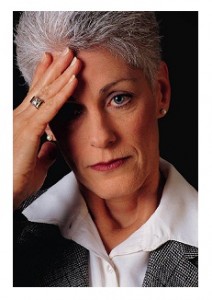I was watching her face intently as she asked questions. I listened as he offered responses in a kind and measured fashion.
 She was expressing emotions. Her feelings were revealed in words, in the tilt of her head downward, and the sadness in her eyes. He is her son; they share a long history and it’s a good one. He was dealing with emotions of his own – or perhaps deflecting them – in this difficult process of moving an older parent into a retirement community.
She was expressing emotions. Her feelings were revealed in words, in the tilt of her head downward, and the sadness in her eyes. He is her son; they share a long history and it’s a good one. He was dealing with emotions of his own – or perhaps deflecting them – in this difficult process of moving an older parent into a retirement community.
Perhaps the fact that I’m an outsider is the reason I witnessed a different conversation. But more likely, I heard her as a woman in a way that he, as a man, did not.
To me, regardless of age and scenario, it was an example of he said, she said – as communication on both sides were missing the mark.
What she said is not what he heard. What he said is not what she understood.
Was I correct in my reaction to her words and non-verbal communication? That she was speaking from feelings, from full awareness of her stage in life, from fear of abandonment, while he was responding to logistics from a place of actions, from the relative vitality of midlife, and perhaps from a small measure of emotional denial?
Men and Women, Communication Styles
So how is it that we communicate at cross purposes? What kind of work does it take to bridge that gap – especially when reassurance is needed, when emotions run high, and when the stakes – psychologically – may be even higher?
My sons are teenagers, and we communicate differently. We hear and interpret differently, though one is more attuned to reading my expressions than his brother. And there are expressions to be read – the signs inherent in non-verbal communication that include the gesture, the glance, the stance, the angle of the head, the tone of voice.
Research bears this out: women express more facially – through movement of lips, cheeks, eyebrows.
 So is it nature or nurture that determines our varying approaches to communicating emotion? Why do we speak and listen so differently? Is it biology? Chemistry? How much is cultural? How much can be reshaped?
So is it nature or nurture that determines our varying approaches to communicating emotion? Why do we speak and listen so differently? Is it biology? Chemistry? How much is cultural? How much can be reshaped?
Certainly, we encounter both men and women who are empathetic and learn to communicate in ways that make use of that tool.
Perhaps it’s in puberty that the shift occurs, though it may be more gradual or happen sooner. But it happens – as girls and women generally zero in on the meaning behind language – what isn’t said as well as what is – reading context, expressions, and the manner in which the message is delivered.
Is this tied to the stereotypical notion that women want to talk, and men want to act – or more specifically, to fix things when sometimes the “fix” is really as simple as discussing the matter? Getting feelings out into the open?
Is it a fact that women identify emotions more easily, and thus can articulate them, whereas men do not?
Psychology Today
According to a 2010 article in Psychology Today on men, women, emotions, and communication:
Most men have a hard time communicating anything that remotely resembles an emotion. Why? Because emotions are scary to men, who think much more than they feel, and much of the time, many men don’t even know what or how they are feeling… It is interesting to note that women think and feel at the same time, while men can only think or feel.
Women are thought to be better at multitasking than men, but apparently women are also more capable of simultaneously thinking and feeling.
To be frank, processing rationally and emotionally at the same time seems routine, to me. I’m guessing it does to most women. And it would never have entered my mind that men (generally) don’t process in this fashion.
Of course it’s more complex than this (biology, chemistry, nature, nurture – not to mention learning to control our emotional responses in order to achieve a particular goal); still, would this explain the differences in hearing and interpreting? Are men socialized to block receipt of emotional messages?
While the article I reference deals largely in the context of relationships and conversational styles – as in the proverbial “We need to talk” that requires a man to switch gears (“from head to heart”) – it also addresses the fact that apparently women speak more quickly and have more words at their disposal. Surely this is socialization – isn’t it? And particular to Western cultures?
A variety of other differences in how men and women communicate are mentioned, but the issue of how we listen is not. Yet if men are more averse to emotional discussions, might this mean that women ought to cut them a break, slow down, and take more time in trying to bridge the communication gap – whatever its origin?
Listening Skills Can Be Learned
Following the exchange overheard between mother and son, I put my little toe into a private conversation of my own. I suggested to the gentleman that his mother wasn’t hearing what he was saying in the way he intended it. I also suggested that her body language and words were speaking from an emotional zone that is scared about being left alone, though that certainly isn’t his intention.
 I saw what I believe to be a request for reassurance – that ongoing communication and visits will continue as usual, that this move to a beautiful, independent living community truly is about providing amenities and security, and is in no way an attempt to send her away or forget about her. And this is where actions will help – the continuation of his usual rhythm of calls and visits.
I saw what I believe to be a request for reassurance – that ongoing communication and visits will continue as usual, that this move to a beautiful, independent living community truly is about providing amenities and security, and is in no way an attempt to send her away or forget about her. And this is where actions will help – the continuation of his usual rhythm of calls and visits.
The situation is challenging, and there is no “cure” to aging except the obvious. As for aging gracefully, this woman certainly has. But she is experiencing a major transition, and is understandably afraid. That none of us who are at another stage in life can fully appreciate what she’s feeling is, of course, inevitable.
What isn’t inevitable is learning to listen with the heart, to read the look in an eye, and perhaps – for men and women to translate for each other. Men, when women need the assist, and likewise the other way around, when the situation calls for it.
You May Also Enjoy
Nature or nurture? From my experience, nature. I’ve tried to raise/communicate with my children as equally as I can. But what worked with my daughter, doesn’t always work with my sons. No matter how hard I try.
Have a child of each gender certainly does show the differences, doesn’t it!
First I blogged, then I read. Interesting how close our topics are to one another. I think largely nature, a difference in listening and hearing. I know he often does not hear what I’m saying the way I mean it. I’m sure it works the other way too.
Amazing when we really look and listen, Carol. I think it’s easier to see it in others than ourselves though. And it certainly goes both ways, as you say! (Hope you’re having a nice weekend.)
I might have shared this before but every time this topic comes up I think of this comedian and his bit on communication.
Mark Gungor – Men’s Brain Women’s Brain
http://youtu.be/0BxckAMaTDc
Thanks, Jack!
I heard a This American Life piece once about a woman who transitioned into a man. When she started taking testosterone, she suddenly discovered she could understand physics. Not only that, she loved physics. Testosterone. Anecdotal, but suggestive.
Physics? Really? Huh. Well – as for anecdotal, Wolf – these days I think it’s as good as the so-called statistical, short of a serious researcher applying statistics to carefully (and common sensically?) controlled studies…
Such a timely post! Yesterday The Man and I had a ridiculous argument. We don’t argue often, but when we do it’s almost always because I’m expressing something emotional and he’s trying to “fix” it with something logical. I don’t even remember what the specific argument was yesterday – something about our patio. How silly is that? But it wouldn’t have been an argument at all if we’d been communicating effectively about it.
I was nodding my head in agreement the whole time I was reading this post.
Nice to have you join in, Martini Mom. (Amazing how easy it is for men and women to just miss each other with our communications, isn’t it?)